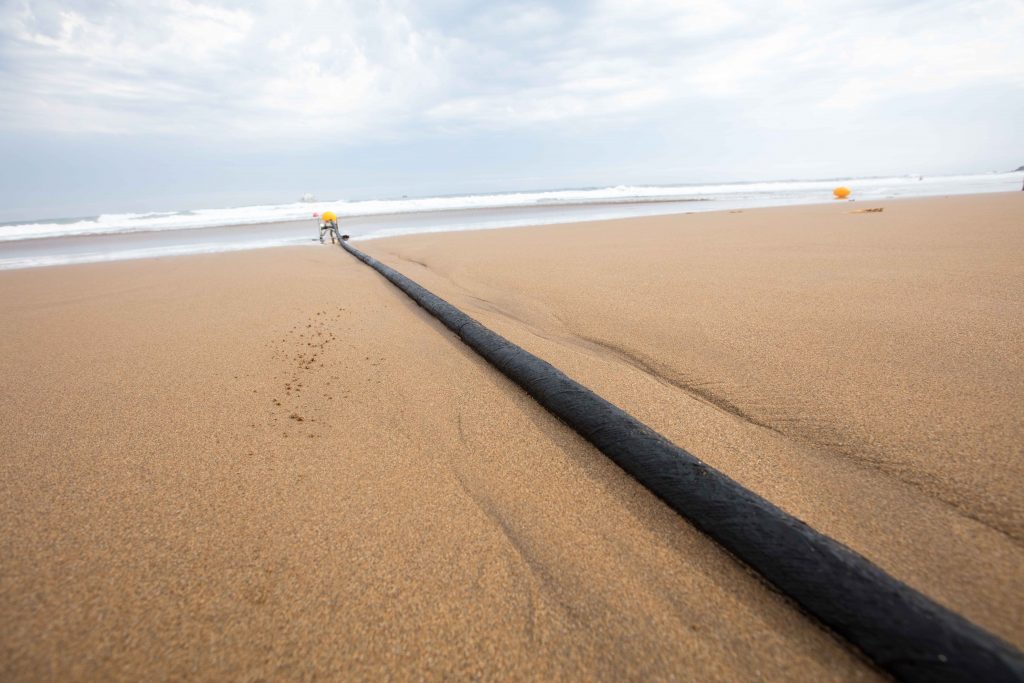

Microsoft and Facebook have laid the highest capacity subsea cable in the Atlantic, hoping that the new route will safeguard internet traffic against natural disasters.
‘Marea’, which is Spanish for tide, connects Virginia Beach in the US with Bilbao in Spain, and is capable of carrying 160Tbps. It comprises eight fibre optic cables surrounded by copper, plastic and waterproof protection and is 1.6 times the size of a garden hose.
Construction started last year and the cable was laid within five months. It is expected to go online early in 2018, a schedule which the partners say is three times faster than normal.
Microsoft and Facebook agreed to work on the cable, together with Telefonica subsidiary Telxius, after becoming concerned about the impact of Hurricane Sandy in 2012.
The storm shut down broadband and mobile phone services for several days, taking down websites, electronic trading platforms and online media services. Not only did this impact major industries, it also stopped people from telling friends and family they were safe.
With Microsoft investing significantly in cloud services and Facebook’s own interest in keeping its platform going, the new project seemed a logical step.
“It was a major disruption,” says Frank Rey, director of global network strategy for Microsoft’s Cloud Infrastructure and Operations division. “The entire network between North America and Europe was isolated for a number of hours. For us, the storm brought to light a potential challenge in the consolidation of transatlantic cables that all landed in New York and New Jersey.
“We kept running into [Facebook] at industry events and meetings. We collectively recognized that we were each trying to solve the same problem and could combine our technical and engineering expertise to reinforce the transatlantic network and design a better cable for global connectivity.”
The decision to lay the cable more southerly than existing connections was made with the hope that if a disaster strikes one part of the US, then there is an alternative route to handle traffic. Bilbao is also a convenient location for network infrastructure linking Africa, the Middle east and Asia.
All companies involved say the cable is open and designed to be interoperable with a variety of networking equipment in the hope it can be futureproofed to cope with future demand.
“Marea comes at a critical time,” says Brad Smith, president of Microsoft. “Submarine cables in the Atlantic already carry 55 percent more data than trans-Pacific routes and 40 percent more data than between the U.S. and Latin America.
“There is no question that the demand for data flows across the Atlantic will continue to increase and Marea will provide a critical connection for the United States, Spain, and beyond.”
Microsoft has also invested in cables connecting its Irish and US data centres in recent years, while other tech and telco giants have also been improving their infrastructure. Huawei has upgraded sections of the West Africa Cable System while Google and Facebook are among the backers of a 12,800km Transpacific route between Los Angeles and Hong Kong.
Take our Microsoft quiz here!
American space agency prepares for testing of Boeing's Starliner, to ensure it has two space…
As UK and Europe develop closer military ties, European Commission says it will invest €1.3…
Zuckerberg seeks to revive Facebook's original spirit, as Meta launches Facebook Friends tab, so users…
Notable development for Meta, after appeal against 2021 WhatsApp privacy fine is backed by advisor…
First sign of shake-up under new CEO Lip-Bu Tan? Three Intel board members confirm they…
Trump's nominee for SEC Chairman, Paul Atkins, has pledged a “rational, coherent, and principled approach”…